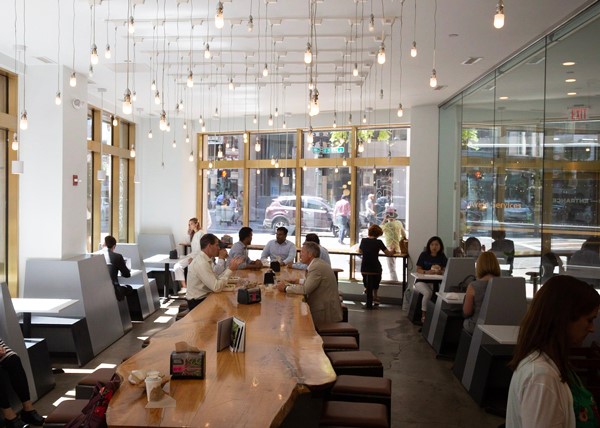Years after flooding urban markets across the country, concepts that started as food trucks are morphing into more permanent brick-and-mortar spaces. One such example of a food truck finding a permanent parking place in the brick-and-mortar world is Boston-based Clover Food Lab. Here Lucia Jazayeri, creative director at Clover Food Lab, maps out the company’s transition.
Q: What is the history/story behind Clover Food Lab?
A: Clover was founded in 2008 by Ayr Muir as an experiment to see if meat lovers could fall in love with vegetables. Ayr had read a study about the impact of food on climate change and thought he could do something about it. This led to the Clover Food Truck, which Ayr first parked at his alma mater, MIT, in Cambridge, Mass.
Q: Why a food truck?
A: Ayr was nervous about investing money in a whole restaurant, or a whole chain of restaurants, before he had nailed down a menu that would be intriguing to folks. So he set his sights on a food truck — essentially a fully operational kitchen on wheels without the high costs of real estate. Every day on the truck we tested something new, from a new menu item to a new way of talking to customers to a new way we displayed items on the menu board. The food truck test was only intended to last six weeks, but almost immediately it became a sensation on the MIT campus — people couldn't seem to get enough of our chickpea fritter sandwiches, french fries with rosemary, soups made from scratch and more.
Q: How did you go from food truck to brick and mortar?
A: We opened our first brick-and-mortar restaurant two years to the day after the first food truck opened on October 29, 2010. The restaurant was the result of a lot of recipe testing on the trucks. The first Clover truck was part of a food truck revolution in Boston. At the height of our food truck program, we had seven trucks parked all over the Boston Metro area. We've since been able to open permanent restaurants in nearly every neighborhood where a truck used to park, and we've entered new markets such as the suburbs, college libraries and Whole Foods Markets.

Q: Do you have a prototype design or are all the locations a little different?
A: We have some inherently “Clover” design elements that are consistent through each restaurant — for example, low countertops so that customers can see food prep happening; no back of house so that all the food prep is visible, and a big, wooden communal table made from salvaged lumber. We use red oak from Berkshire Products — they are essentially slices of entire trees! Ultimately, each location ends up being a little different and takes on a personality of its own.
Q: What is the kitchen setup like to accommodate fresh, local food?
A: As mentioned, we have a completely open kitchen, so guests are able to watch all of our food prep as they order, wait for their food and eat. We do not use any walk-ins or freezers, as we receive deliveries of our fresh produce almost daily. Instead, most of our locations have a three-glass-door refrigerator that showcases all our locally sourced produce. In terms of cooking equipment, our oven and fryer probably see the most use in our restaurants.
Q: How is the kitchen set up to accommodate your kosher offering?
A: All of the brick-and-mortar restaurants, as well as the commissary, are kosher, but because we are a meatless restaurant, we do not have to worry about cross-contamination with meat and dairy in terms of kitchen equipment and setup. All of the food, however, is under the strict Orthodox rabbinic supervision of Rabbi Barry Dollinger of Congregation Beth Sholom in Providence, R.I. Rabbi Dollinger kashers every new restaurant we open and renews our kosher certificates each year.
Q: What, if any, equipment and design changes have you made as you prepare to expand?
A: As we prepare to expand, we're thinking about how to accommodate for much higher volumes of customers. We're thinking about adding more fryer and oven capacity and potentially also induction rethermalizers for hot-holding and/or warming drawers. One major change we made about a year ago was releasing an online ordering app. We built this app in-house completely from scratch and introduced a custom-made pickup stadium area into our restaurants to take this into account. As far as unit expansion goes, we will be opening our 13th overall restaurant and first restaurant in the Back Bay of Boston this fall! Bigger picture, we hope to see Clover in more cities in the future.




